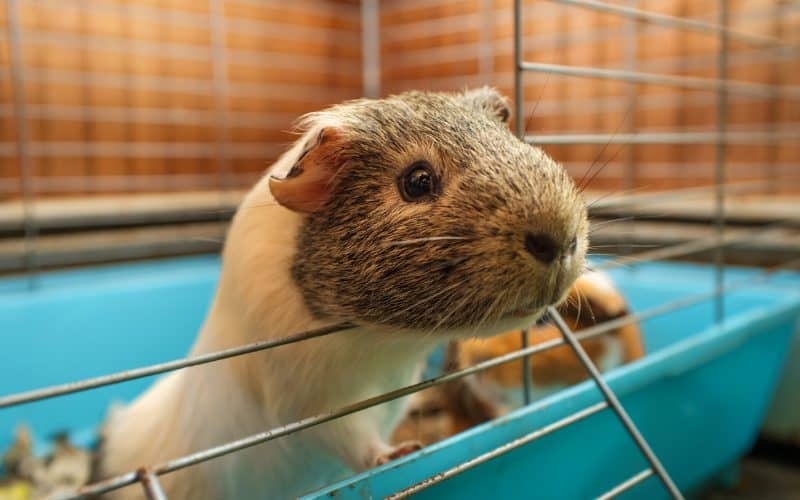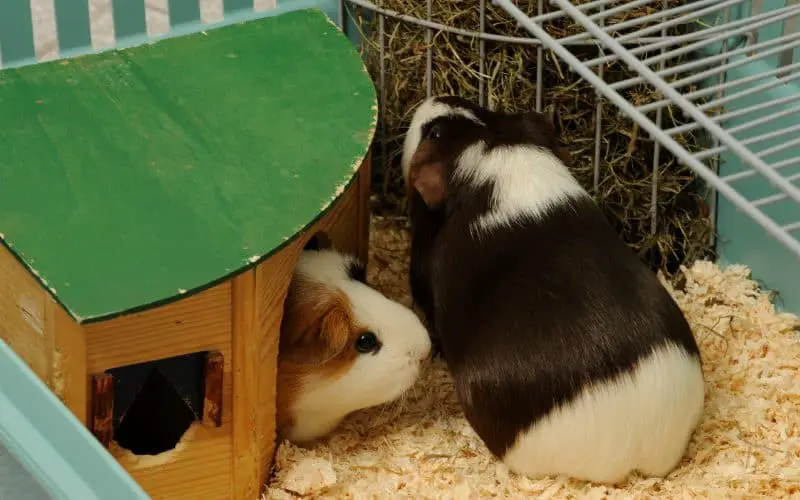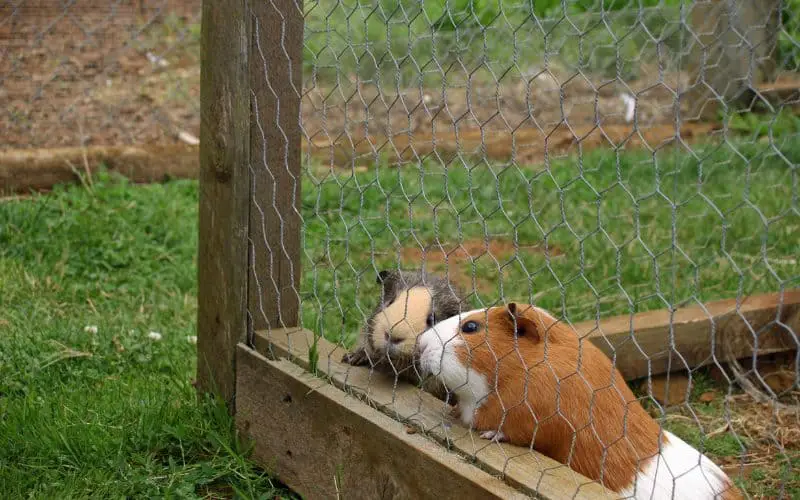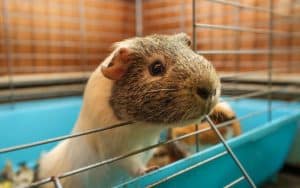Guinea pig owners frequently complain about the fishlike smell coming from the pet’s cage. How Often Should You Clean Guinea Pig Cage? Taking care of your guinea pigs is a perk that requires both effort and time. Caring for your cavies is not limited to properly feeding them alone.

Knowing how often you should clean your guinea pig cage is vital for them to stay comfortable, clean, and healthy. Sadly, your guinea pig will smell when you do not keep their cage and living environment meticulously clean and as comfortable as possible.
Many pet owners agree that it is vital to keep the pet’s hutch clean however, how often should you clean guinea pig? It is advisable to spot clean the cage daily and deep clean weekly. But this does not apply to guinea pigs alone, but all pet cages.
This piece will shed some light on how often to clean your guinea pig cage and we will also suggest some efficient methods to have them cleaned.
How Often Should You Clean Guinea Pig Cage?
You should spot clean your guinea pig cage daily and conduct a deep cleaning at least once a week. Deep cleaning the cage involves removing the bedding and every other thing inside the cage. Then use a sponge or brush and clean out the base. Make sure you remove all debris that has been collected at the edges of the cage.
The frequency of spot cleaning the cage depends on the number of pigs you have and how old they are. If you have more pigs, you will have to frequently spot clean the cage to remove faecal matter. Adult pigs drop faecal matter at a higher frequency, ergo the regular need for spot cleaning.
Guinea pigs are very social pets, they will appreciate your effort of cleaning out their cage by jumping around the cage in excitement. If you ask us, that is a worthy reward.
How Do You Spot Clean A Guinea Pig Cage?

To spot clean your guinea pig cage, follow these steps:
- Using a brush and a dustpan or a vacuum cleaner, carefully clean out areas of the cage that has pig poop.
- Remove parts of the beddings that are heavily soiled and replace them with a fresh patch.
- You should spot clean the cage daily to maintain the health of your pig. The type of material the bedding is made from will determine how often you have to replace it.
How Do You Deep Clean A Guinea Pig Cage?
To deep clean your guinea pigs cage, follow these steps:
- Move your guinea out of the cage. You can have them inside a pet carrier.
- Take away the bedding
- Remove all faecal matter, toys, dried grass, and another item in the cage
- Shake the cage vigorously to remove any fur, grass, or other items that are stuck to the cage
- Use a sponge or brush and carefully clean the floor of the pig’s cage. Ensure you get all the edges; they are a sweet spot for debris.
- Using a soft towel and a solution of baking soda and white vinegar, gently wipe the interior and exterior of the cage. This eliminates any odour coming from the cage.
- Wash all the items you removed from the cage and allow them to dry completely.
- After the cage is completely dried, you can place the items back. Never put the cage back when it is not completely dried, a damp cage promotes infestation of germs.
What Can You Use to Clean Guinea Pig Cage?
The key to picking a cleaning product for your pet’s cage is to get a one that is strong enough to get rid of the germs but not too harsh to harm your pig.
The best cleaning products for your guinea pig cage are:
- Mild detergent combined with warm water. Ideal for washing toys, hideouts, food containers, and more. Choose one that does not have a pungent smell.
- White vinegar. It is suitable for disinfecting the cage. It also gets rid of any odour from your pig cage. White vinegar effectively removes stains caused by urine.
- Cage wipes. Using cage wipes to clean your pig’s cage is an effective method of cleaning, deodorizing, and disinfecting the cage in one wipe.
- Cage deodorizing spray. Use a cage deodorizing spray to clean your pet’s toys and any other items inside the cage. A deodorizing spray is useful in removing the unpleasant odor from the cage and for cleaning the urine stain.
What Are Products to Avoid for Cleaning Guinea Pig Cage?
Avoid using these products for cleaning your guinea pig cage:
- Bleach
- Disinfectant
- Scented cleaners
These products leave deposits on the cage which are harmful to your guinea pigs.
How To Keep Guinea Pig Cage Constantly Neat

To keep your guinea pig cage constantly smelling fresh follow these guidelines:
- Regularly clean the cage. Use an odorless product while cleaning the cage.
- Use bedding that can subdue the odor coming from the pig poop and urine. Fleece and aspen bedding are very good choices.
- Neuter or spay your pigs. This eliminates the strong acrid smell that comes from the guinea pig.
- Use the right size of cage. A larger size cage provides your pig with enough room to play, eat, sleep, and poop. If there is enough room for your pigs, they will not poop all over the cage and end up soiling their coat.
- Feed them properly. Feeding your guinea pig excessive sugary food and veggies will result in diarrhoea.
- Ensure the room is properly ventilated. Make sure there is a proper flow of fresh air in the room where your guinea pig is.
- Use air purifiers. A HEPA+ Carbon based air purifier will eliminate bad odor from the cage and room.
Watch this video:
What Happens When You Do Not Clean the Guinea Pig Cage?
Not cleaning your guinea pigs cage will result in the following:
- Smelly room. This is because of the build-up of poop and ammonia from the pig’s urine.
- Respiratory problems. Not often cleaning your pig’s cage will cause them to develop upper respiratory tract infection (URI).
- Bald fur patches.
- Bumblefoot. Beddings soaked with urine cause the guinea pig to develop bumblefoot. This is dangerous to the pig’s health if left untreated.
- Urinary tract infection. This is life-threatening if left untreated.
- Stress and discomfort. Our lovely guinea pigs are social animals that love to stay clean. An untidy environment leads to stress in the pigs. When the pig is stressed, it takes out the stress on its fur, on the cage, and any other item around.
Is It Safe to Use Air Freshener for Your Guinea Pigs?
It is not safe to use air fresheners for your guinea pigs because they possess a very strong sense of sense. Having such a fragrance around them leads to respiratory tract issues. Essential oils are also harmful to our pet guinea pigs. An alternative to air fresheners and essential oils is proper ventilation or air purifiers.
Does the Type of Bedding Used Control Odor?
The type of bedding used will affect how much odor is produced from the guinea pig cage. You can completely stop or reduce the amount of odor coming from the cage by using the right type of bedding.
The following are a list of some of the best odor control beddings:
Fleece bedding
Custom-made fleece liners for our guinea pigs many of which are commercially available, perform excellently in trapping the odor. This prevents the odor from polluting the room.
Our picks are the Custom cage liners or Guinea Dad fleece liners.
Paper bedding
There are a lot of paper beddings that you can use in your guinea pig cage. However, they do not have the same quality. We recommend Carefresh paper bedding. They have excellent quality.
Aspen bedding
This is an odor-free and supper absorbent bedding you can use for your guinea pig. For the best result, we recommend you use this Small Pet Select Aspen Bedding.
Fleece beddings are our favorite because they can be washed easily, saving you a lot of cost over time.
While we are at it, here are a couple of bedding you should do all you can to avoid:
- Crystal cat litter. This type of bedding is dangerous for our little guinea pigs. Crystal cat litter can easily be ingested by the pig leading to profoundly serious health hazards such as choking etc.
- Cedar or pine bedding. These are not good bedding because they poorly absorb the urine leading to the production of foul smell from the cage.
- Hay. Using hay alone as bedding will eventually lead to a pungent smell coming from the pig cage. This is because the urine is not absorbed. Therefore, if you must use hay, combine it with aspen bedding.
- Puppy pads. This is not an ideal long-term bedding material. To prevent the cage from smelling, use a fleece bedding instead.
Conclusion
For your lovely pigs to remain in a healthy condition, it is imperative that you thoroughly clean the pig cage often. How often should you clean guinea pig cage? Spot clean the cage daily and deep clean weekly.
Maintain cage hygiene is vital in keeping our cute little pets in sound mind and health. Ensure you buy a cage that has enough room. It will make the cleaning task a lot easier.
Nature's Miracle Small Animal Cage Scrubbing Wipes Extra Thick

Nature's Miracle pet stain and odor removers have been a trusted brand for pet mess cleanup for more than 30 years. With the expansion to training aids, cat litter, disinfectants and other products, Nature’s Miracle brand can be trusted to provide innovative solutions to a range of pet problems.
Product SKU: B00P7HP4T8
Product Brand: Nature's Miracle Small Animal Cage Scrubbing Wipes
4.6
Pros
- Great and effective cleaning product
- Convenient and eliminates bad odors
Cons
- Not wet enough and easily dried out
- Not as effective as spray
Nature’s Miracle Cage Cleaner

Nature’s Miracle pet stain and odor removers have been a trusted brand for pet mess cleanup for more than 35 years. Whatever pets do, you can trust Nature’s Miracle stain and odor removers, training aids, disinfectants and litter products to undo.
Product SKU: B07HZMX3BS
Product Brand: Nature’s Miracle Cage Cleaner
4.7
Pros
- Great scent and effective cleaner for cages
Cons
- Gets leaked out/poor packaging
GuineaDad Liner Guinea Pig Fleece Cage Liners

At GuineaDad, we dedicate our lives to continually improve and innovate for a guinea pig's world. Helping piggies live their lives to the fullest. Safe, comfortable bedding is the key to your guinea pigs living long lives.
Product SKU: B073ZYWQN4
Product Brand: GuineaDad Liner
4.7
Pros
- Great in size and absorbent
- Works better than other bedding
Cons
- Too expensive and not leak proof
Carefresh 99% Dust Free White Natural Paper Small Pet Bedding with Odor Control

Specifically designed for small pets, carefresh pet bedding is sustainably made from scratch with pillowy-soft, ultra-absorbent natural paper fiber. Whether filling a hamster's home or looking for the perfect guinea pig bedding, our natural small animal bedding provides your pet with a soft, safe, clean and dry place to burrow, nest, and nap.
Product SKU: B00PBM761S
Product Brand: Carefresh Small Pet Bedding
4.6
Pros
- Natural paper bedding making comfortable nest
- Dustless, soft and odor absorbent
Cons
- Quality inconsistency vary
Small Pet Select Premium Natural Aspen Bedding

Only the Best for You and Your Furry Friend: The ideal Bedding for your rabbit, guinea pig, gerbil, hamster, chinchilla, rat, mouse, snake, reptile, or any small animal; Small Pet Select Premium Small Animal Aspen Bedding is a very low-dust, safe, high-quality product that will last.
Product SKU: B07MR1B8SF
Product Brand: Small Pet Select Premium Natural Aspen Bedding
4.6
Pros
- Low-dust, safe, high-quality bedding
- Less odor and absorbent
Cons
- Inconsistent poor quality bedding